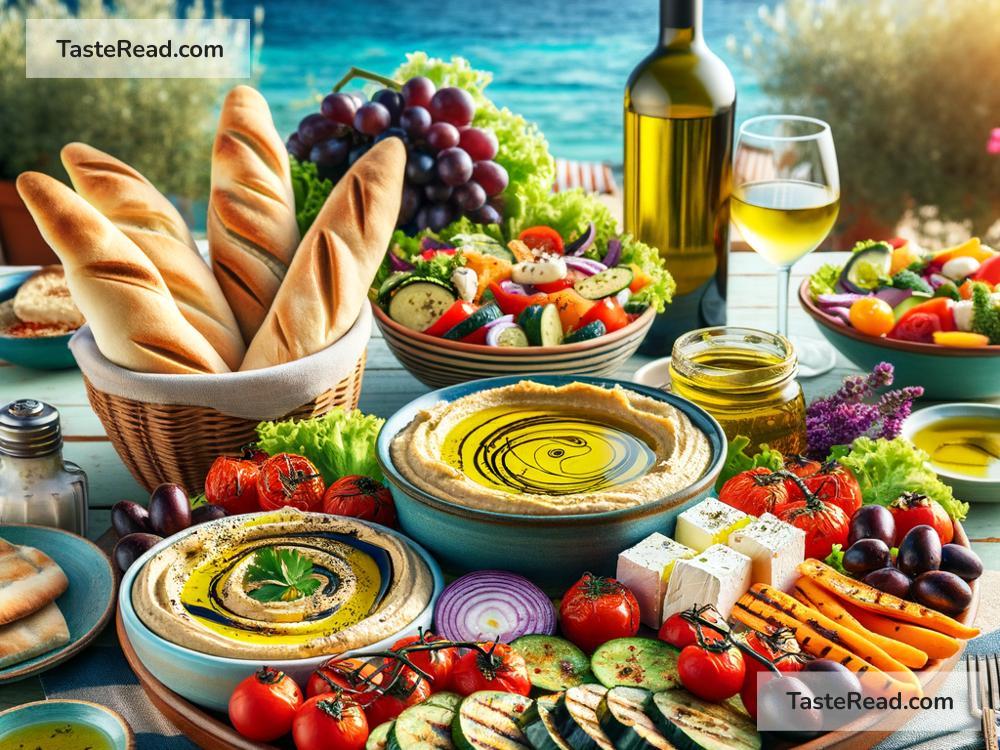The Mediterranean Diet: A Healthy Lifestyle Rooted in Culture
The Mediterranean diet has gained worldwide attention as one of the healthiest ways to eat. Based on the traditional foods of countries bordering the Mediterranean Sea, this diet is not only nutritious, but it’s also deeply tied to the rich cultures and histories of the region. In this blog, we’ll explore the Mediterranean diet, its cultural roots, and why it’s so beneficial for both your body and soul.
What Is the Mediterranean Diet?
The Mediterranean diet isn’t a strict set of rules or meal plans—it’s a way of living and eating inspired by the traditional food habits of Mediterranean countries like Greece, Italy, Spain, and Turkey. It focuses on fresh, wholesome ingredients that are minimally processed. Some key components of the diet include:
- Vegetables and Fruits: These make up the foundation, as they are rich in vitamins, minerals, and fiber.
- Whole Grains: Foods like barley, bulgur, and whole wheat bread provide energy and are healthier alternatives to refined grains.
- Olive Oil: Often called “liquid gold,” olive oil is the main source of fat, used for cooking, dressing salads, and drizzling over dishes.
- Fish and Seafood: Rich in omega-3 fatty acids, fish is eaten regularly, often replacing red meat.
- Legumes and Nuts: Chickpeas, lentils, almonds, and walnuts provide plant-based protein and healthy fats.
- Herbs and Spices: Basil, oregano, rosemary, and garlic are used to enhance flavors.
- Dairy in Moderation: Yogurt and cheese, especially fermented varieties, are enjoyed but not overconsumed.
- Small Amounts of Meat: Poultry and lean meats are used sparingly, while heavy, fatty cuts are avoided.
An important aspect of the Mediterranean diet is the focus on enjoying meals with family and friends, savoring the food, and eating in moderation.
Cultural Roots of the Mediterranean Diet
The Mediterranean diet is more than just a way to eat—it’s a window into the history and traditions of the region. Let’s take a closer look at where it came from and how culture shapes its principles.
Geography and Agriculture
Countries bordering the Mediterranean Sea are blessed with fertile lands and sunny climates. This makes it easy to grow olives, grapes, vegetables, fruits, and grains. These ingredients have been staples in Mediterranean kitchens for thousands of years.
For example, olive trees have been cultivated in Greece since around 3,000 BC, and olives remain a symbol of health and abundance in the region. Grapes grown for wine have also long been part of Mediterranean traditions, often used for celebrations and religious rituals.
Ancient Civilizations and Trade
The Mediterranean region has been home to countless civilizations over millennia, including the Greeks, Romans, Egyptians, and Phoenicians. Through trade, these cultures exchanged spices, ingredients, and recipes, helping to shape the diverse food traditions we see today.
For instance, durum wheat, a key ingredient in pasta and bread, was introduced to the Mediterranean through trade routes with North Africa and the Middle East. Similarly, spices like saffron and cinnamon made their way into Mediterranean dishes from faraway places like Asia.
A Connection to Nature
Mediterranean cultures have always embraced fresh, seasonal produce. Fruits and vegetables are picked at their peak, ensuring vibrant flavors and maximum nutrition. Since refrigeration was rare in the past, people relied on eating what was locally available, which naturally led to meals centered on plants rather than processed foods.
Mealtime Traditions
In Mediterranean culture, meals are about more than just eating—they’re a time to connect with loved ones and enjoy life. Sharing food with family and friends is deeply valued, and meals are often long and relaxed. Eating slowly also helps with digestion and allows people to appreciate the flavors of their food.
Wine is sometimes part of these meals, consumed in moderation and always paired with food. It’s viewed as a way to enhance a meal rather than as a drink to overindulge in.
Health Benefits of the Mediterranean Diet
Numerous studies have shown that the Mediterranean diet can improve health and extend life. Some of the most significant benefits include:
- Heart Health: Olive oil, fish, and nuts contain healthy fats that reduce bad cholesterol and lower the risk of heart disease.
- Weight Management: The focus on whole foods and plant-based meals can help maintain a healthy weight.
- Improved Digestion: High-fiber foods like fruits, vegetables, and legumes support gut health.
- Brain Health: The diet’s emphasis on omega-3s from seafood and antioxidants from fruits and vegetables may protect against cognitive decline.
- Reduced Inflammation: Natural, unprocessed foods help reduce inflammation, which is linked to many chronic illnesses.
Beyond the physical benefits, this diet promotes emotional and social wellness. Sharing meals with loved ones, enjoying the cooking process, and appreciating the food on your plate can bring joy and reduce stress.
Bringing the Mediterranean Diet to Your Life
Adopting the Mediterranean diet doesn’t mean you have to completely change your kitchen overnight. You can start small and gradually incorporate its principles. Here are a few simple tips:
- Replace butter or margarine with olive oil.
- Add an extra serving of vegetables to your meals.
- Swap white rice for whole grains like quinoa or bulgur.
- Include fish in your weekly meal plan.
- Snack on nuts or fresh fruit instead of processed snacks.
- Explore Mediterranean-inspired recipes like Greek salads, hummus, or ratatouille.
A Celebration of Health and Culture
The Mediterranean diet is special because it’s more than just food—it’s a way to embrace the beauty of a balanced, joyful lifestyle. Its roots in Mediterranean traditions remind us that eating well doesn’t have to be complicated. It’s about choosing fresh, wholesome foods, enjoying meals with loved ones, and living with gratitude for the simple pleasures in life.
So, whether you live near the Mediterranean Sea or halfway around the world, you can bring the spirit of this diet to your table. With each bite, you’ll not only nourish your body but also celebrate a culture that’s been thriving for centuries. Happy eating!


